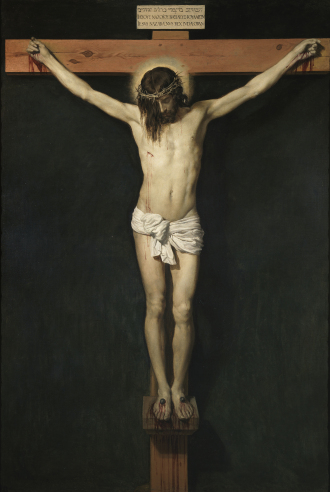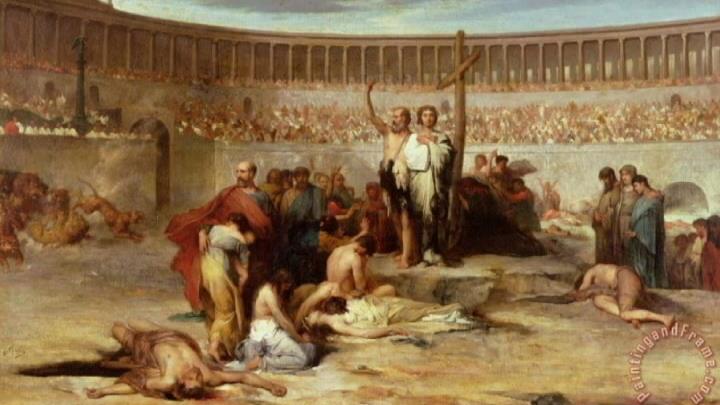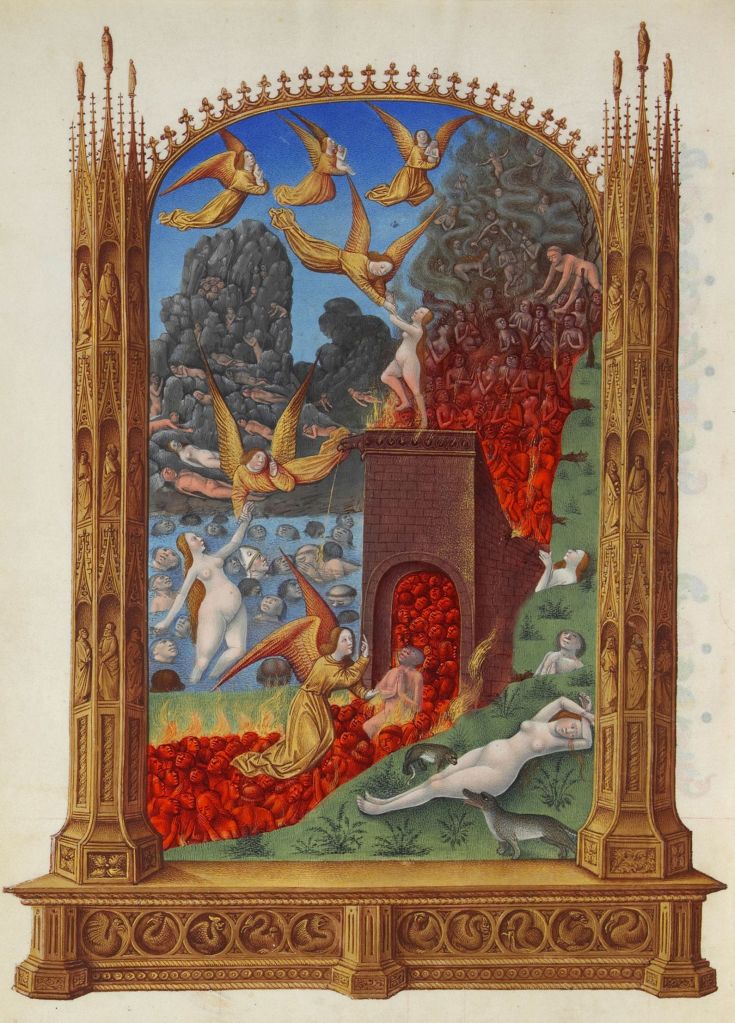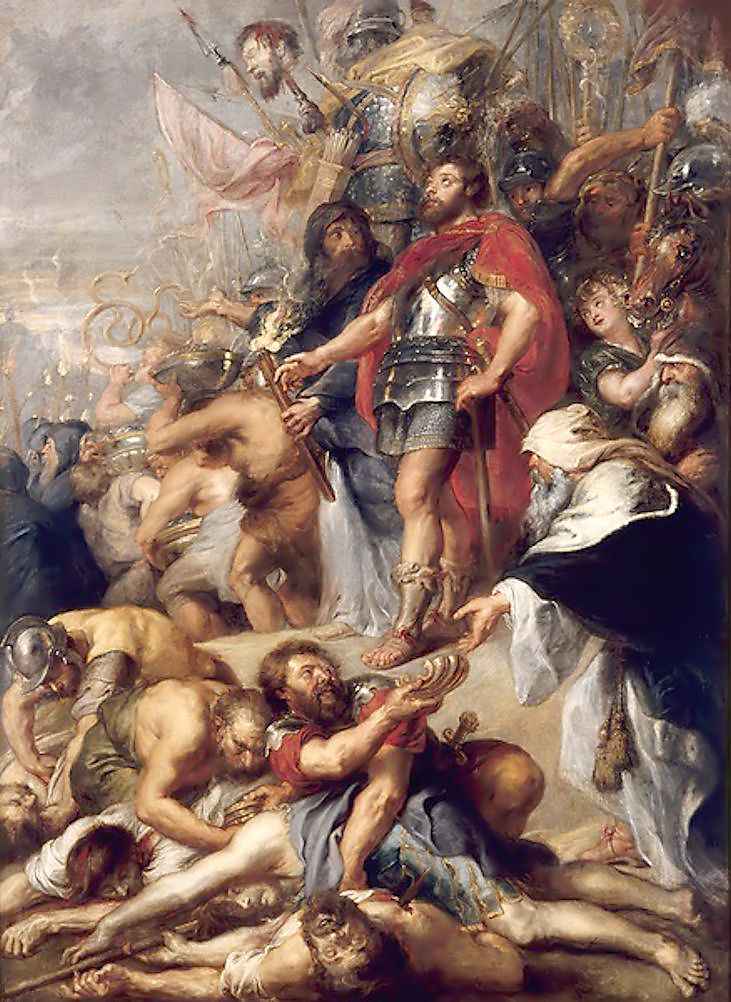
After All Saints Day and its spooky (though thoroughly Catholic) vigil, Halloween, we come to the third of the fall Triduum of the Afterlife: All Souls Day (or in its Mexican (and thoroughly (or at least mostly) Catholic) manifestation, Dia de los Muertos). And after discussing who the saints are, and what constitutes life in Heaven, it is common to wonder why the Church turns our attention to any others who have preceded us in death. If the goal of this life is eternal life with God in Heaven, and all of us either end up enjoying the unending happiness of this beatific vision, or cut ourselves off from it (and so consign ourselves to the eternal frustration and torment of Hell), it seems there could be no third possibility. Yet, after celebrating those who are enjoying the first alternative, the Church encourages us through the liturgy to remember and pray for others of the faithful departed in neither final destination. So, why does the Church believe that some of the dead need our prayers, being in a state of the afterlife, purgatory, that is neither Heaven (where they would not need them) nor Hell (where the dead are beyond our prayerful help)?
Choices Have Consequence

To understand what purgatory is and why we (or most of us) need it, we can start with recognizing a pretty common part of the human experience: choices have consequences, not only to others and our relationships with them, but even to ourselves. Sometimes, when we make a bad choice, its effects stay with us. This is obvious in the choices that affect us in our bodies: what we eat and drink, and what we do to ourselves that leave a permanent mark on our person. What is true of actions done in and through our bodies, is true of all our bad choices, our sins, and even more than affecting our bodies, they affect our souls – creating dispositions or tendencies to act in similarly disordered and destructive ways. These dispositions or tendencies to act in disordered, that is, sinful ways are vices, or bad habits, and habits, good or bad (virtues and vices) collectively constitute a person’s character.
Our sins, beyond being offences against God, leave their effects on us, causing damage to our souls, and impeding our ability to live and function, especially to love, as God intended. This damage, so long as it remains, keeps us from attaining complete and perfect communion with God, for it keeps us from sharing fully in God’s own life, which is a life of self-giving love. This kind of effect of sin stays with us; it clings to us, and we have to rid ourselves of it in order to cling fully and completely to God.
As the Letter to the Hebrews says,
let us rid ourselves of every burden and sin that clings to us and persevere in running the race that lies before us while keeping our eyes fixed on Jesus, the leader and perfecter of faith.
Hebrews 12:2
And these effects of sin continue to cling to us, even though God forgives our offenses through Jesus’ sacrifice on the cross. Yet, these effects are temporary so long as we are fundamentally in friendship with God, having accepted (and not subsequently rejected) His forgiveness, so that we remain in a state of His grace.
Purgatory is the temporary state after death wherein God’s grace purifies souls, and they are rid of the after-effects of bad choices.
Thus, sin has two effects:
First, and foremost, sin damages our relationship with God. Sin is fundamentally a rejection of the friendship God offers us, the offer to share in His life. In order to make us co-heirs with the Only-Begotten Son (and True Heir) of God, God gratuitously offers to adopt us as His children into the Divine community. Indeed, this is why He created us, to share in His Trinitarian life of love. To reject His offer of Himself in Love is the essence of sin, and this rejection results in our guilt before Him, our estrangement from Him. The Only Begotten Son of God therefore became a man in Jesus Christ, and died on the cross, just to atone for this guilt and overcome our estrangement (see Why Jesus Died on the Cross).
Now, we can damage our relationship with God, and thereby incur the guilt of sin, either
- totally, in a deadly manner, killing the life of God in the soul. This is called mortal sin (see 1 John 5:16 below), or
- partially. This is called venial sin.

The effect of mortal sin, if unrepented, is in the loss of eternal life. It is the rejection of heaven (i.e., hell) and it is called eternal punishment because this effect, if unredeemed, lasts forever. As the Catechism of the Catholic Church says, unrepented mortal sin makes us incapable of eternal life (CCC 1472). So, hell is not the torture God (arbitrarily) inflicts on sinners for failing to worship him as he (narcissistically) demands. Rather, it is what the damned do to themselves in choosing themselves over God and self-giving love; it is the eternal effect of finally and completely rejecting God and cutting themselves off from Him.
God forgives the guilt (eternal punishment) we all incurred from our sin in the sacrifice of Jesus on the cross, and faith in Christ’s sacraments gives access to this forgiveness and to eternal life. As Jesus says,
whoever believes and is baptized will be saved.
Mark 16:16
Or if someone has been baptized, then she receives forgiveness by repenting and confessing her sins:
Whose sins you forgive are forgiven them, and whose sins you retain are retained.
John 20:23, see also, Matthew 18:18

With venial sin, one still has the life of God in the soul because, while acting against God’s will, she has not rejected God’s friendship completely and totally. Such a person would still be in a state of grace and have God’s life active in her soul, but that life is strained or weakened, but not dead. And so, a soul that dies with unconfessed venial sin does not lose salvation and heaven. But neither is that soul ready for heaven. Even if one receives complete and total absolution of the guilt of both mortal and venial sins in the Sacraments of Reconciliation or Anointing of the Sick immediately before death, she may still not be ready for heaven because of the “burden and sin that clings to us.”
This is the other effect of sin: the damage it does to ourselves. This is called temporal punishment (as opposed to eternal punishment), and it remains with us temporal beings even after God has forgiven the guilt of both venial and mortal sins. Both mortal and venial sins attach us too much to things other than God – pleasure or power or revenge, love of self over love of God. And this attachment isn’t a guilt that God forgives, but an impurity that must be cleansed, but it is cleansed also through God’s merciful grace. Again, as we are temporal beings, a temporal process is necessary to remove this impurity, either in this life or after death.
Thus, the reason there is purgatory is that we have to be made perfect, to love as God loves, in order to dwell with him in Heaven. Jesus tells us
So be perfect just as your heavenly Father is perfect.
Matthew 5:48
And Scripture elsewhere says,
But nothing unclean shall enter [heaven] . . .”.
Revelation 21:27

Indeed, the reason Jesus became man and died on the cross was not only to atone for our guilt, but also to allow and empower us to become perfect and pure, capable of sharing in God’s life.
And the way we attain holiness and perfection is, in part, through penance – difficult or painful experiences endured out of love. As Jesus says,
If anyone wishes to come after me, he must deny himself and take up his cross daily and follow me.
Luke 9:23
Again, as the Letter to the Hebrews says, God disciplines us
for our benefit, in order that we may share his holiness . . . that holiness without which no one will see the Lord.
Hebrews 12:10,14
Holiness and perfection, thus, are necessary to see God in Heaven. The holiness and perfection we attain comes through the remission of temporal punishment incurred due to venial, but especially mortal sins, and this purification comes through patiently enduring suffering and our own personal crosses, bearing them out of love as Christ did (and indeed with His grace).

Some people do attain perfect holiness in this life, i.e., the martyrs and saints (officially recognized by canonization, or not), and they go immediately to heaven. But the souls who die in a state of grace and without mortal sin are redeemed and forgiven by God’s mercy given in Christ; as such, their eternal punishment is remitted. But they may still have to suffer the temporal punishment for their sin, and they cannot be admitted to heaven until they are sanctified and made perfect. Such souls have to be purified in purgatory.

Purgatory is the state after death where temporal punishment, the damage to one’s soul or character (which makes one a sensuous or an angry person, for example) is healed or cleansed away (i.e., purged as by fire) as the damage was meant to be healed by penances while a person was still alive.
Saint Paul tells us that on Judgment Day, the work a person has done,
will be revealed with fire, and the fire itself will test the quality of each one’s work. If the work stands that someone built upon the foundation (of Christ), that person will receive a wage [i.e., enter heaven]. But if someone’s work is burned up, that one will suffer loss; the person will be saved, but only as through fire.
1 Corinthians 3:13-15
Purgatory is “where” this purging “as with fire” happens. Of course, this is metaphorical language for the very real spiritual realities of becoming purified and made holy through suffering.
Indulgences
And, the prayers and sufferings of fellow Christians in the Body of Christ can help heal the spiritual hurt that others suffer. This is what the Church means by Indulgences. (CCC 1471)
Saint John tells us to pray that a fellow Christian who sins – but not mortally – be given life.
“If anyone sees his brother sinning, if the sin is not deadly, he should pray to God and he will give him life. This is only for those whose sin is not deadly. There is such a thing as deadly sin, about which I do not say that you should pray.
1 John 5:16
Deadly, that is, mortal, sin is not helped by prayers, but the other kind, venial sin, is.
And Saint Paul tells us,
Now I rejoice in my sufferings for your sake, and in my flesh, I am filling up what is lacking in the afflictions of Christ on behalf of his body, which is the Church.
Colossians 1:24
Saint Paul is not saying that Jesus did not suffer enough on the cross. Instead, he is saying that the Church, the Mystical Body of Christ, needs to suffer the afflictions which purify it through Christ’s total suffering. Saint Paul is able to make up for the sufferings that other members of the body of Christ still need to endure. He rejoices in what he suffers for the sake of others.

And this spiritual aid applies even to those souls who are suffering the purification of purgatory. The Second Book of Maccabees, relates that Judas Maccabeus, upon discovering that his slain soldiers had been wearing forbidden amulets of idols, “prayed that their sin might be fully blotted out” and so, he had a sacrifice offered in Jerusalem on their behalf. (2 Maccabees 12:43-45). His prayers and sacrifices made up for, “blotted out” or removed the temporal effects of their sins, Scripture tells us; if the sins had incurred damnation, i.e., eternal punishment, no amount of atoning actions by the Maccabee would have had any effect.
To sum up:
Only Christ’s sacrifice atones for the guilt of a person’s sin (eternal punishment) and restores that person to God’s grace and life; only through Christ is anyone saved.
But through our prayers, sacrifices and sufferings, and most especially through those of Christ Himself and His saints, the whole Body of Christ (the Church) can make atonement for the harmful effects, the temporal punishment, which our own or other people’s sins have had on themselves and on the world. Indulgences are these prayers, sacrifices and sufferings of others that are applied to sinners in need of purification in this life or the next (in purgatory only, not hell). Saint Thérèse of Lisieux says, “when we love God our heart expands, and we can give incomparably more tender love to those who are dear to us than when our love is selfish and barren… Love is fed by and develops from sacrifice.”
We can gain indulgences for others in this life through our own efforts, as Saint Paul did, or we can, through the merits of Jesus and the saints, make up for the afflictions lacking to the faithful departed and our loved ones as they are purified after death in purgatory. In this way, the Church offers indulgences (from a storehouse, as it were, of temporal merit) to faithful Christians for certain pious acts, which can then be applied to the suffering souls who need it.
Here are some of the spiritual practices you can do to gain a plenary indulgence (the full remission of all the temporal punishment) either for yourself or for a soul in purgatory. For a full list, see the Enchiridion of Indulgences issued by the Holy See.
- Make special pilgrimages
- Pray during special years (Year for Priest, Jubilee Years (every 25 years)).
- Read the Bible for 30 minutes on any given day
- Pray the Rosary in public
- Pray for dead on All Souls’ Day: attend Mass, visit a graveyard.
- Normally, you can get up to three indulgences on this day – for COVID, this extends through the month of November.
To gain a plenary indulgence, the following conditions have to be met:
- Attend Mass and receive communion on the day of doing the work
- Go to confession within a week of the work
- Pray for intentions of the Pope
- Be free of all attachment to sin.
This doesn’t mean you have to be perfectly holy (a living saint); you may still commit occasional venial sins, but you would not regularly commit serious or habitual sins.
This might be somewhat difficult, but even without it, you can still gain a partial (if not a plenary) indulgence. And the more you engage in selfless spiritual practices (gaining partial indulgences), the less you will be attached to sin, and so able eventually to gain plenary indulgences.
For a more complete treatment on indulgences, see this article by Jimmy Akin
So, trying to gain indulgences is always a good thing. Please pray for me.
3 thoughts on “All Souls Day and Why There Is Purgatory (and Indulgences)”